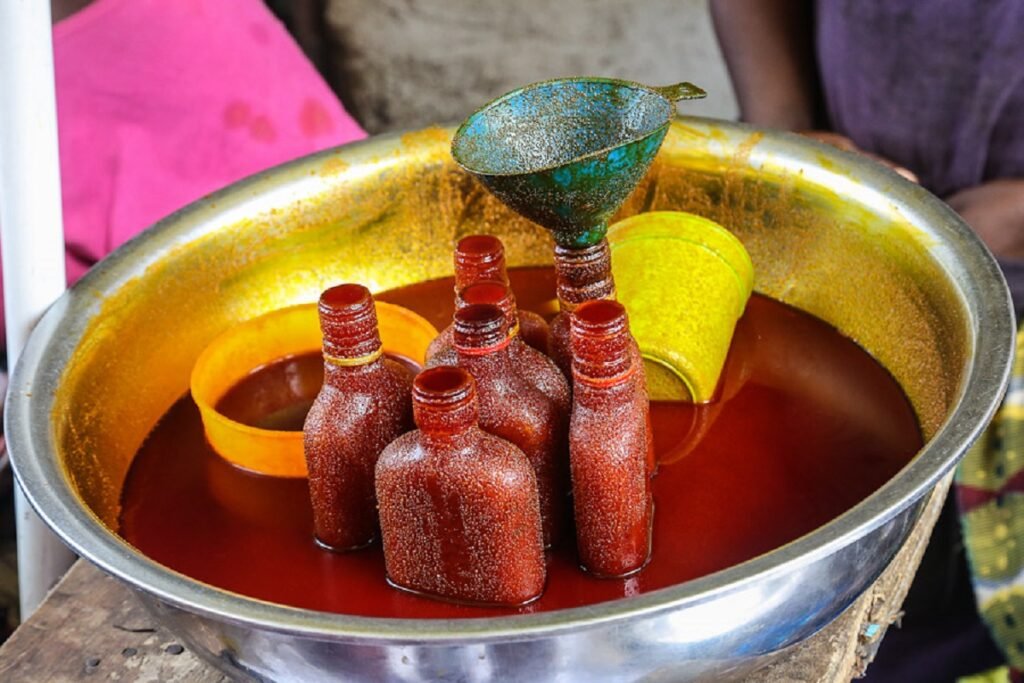Don’t Ask West Africans to Stop Cooking with Palm Oil

OPINION
Disclaimer: “The views expressed in this articles are the sole responsibility of the author(s) and do not necessarily reflect those of AgriGrind. AgriGrind will not be responsible or liable for any inaccurate or incorrect statements contained in this article.”
In this post, I am going to address a comment I get a lot off when I include red palm oil in my West African recipes. I have previously addressed the problem in an Instragram post. However, I wanted to write a blog post as a reference on my website. Every week I get questions about why I use red palm oil in my food. “Isn’t that bad for the environment?” “Why are you calling yourself eco friendly and using palm oil?”
Stop policing and question my food choices and ingredients I use. Palm oil is essential to maintaining my cuisine and I will not have it any other way. I will explain why in the next few paragraphs
The problem with palm oil production is because of colonialism, capitalism and imperialism. The discourse of palm oil has been so routed in those ideologies and leaves little room for people to actually look at where it all started.
Red Palm Oil in West African Culture
The oil palm is indigenous to Western Africa. For centuries the tree has been essential in the fabric of life. The tree grows wild in the forest or planted in cacao farms for additional shade. The branches are used for brooms and housing. The sap from tree is tapped for local alcohol. The fruit consists of the red flesh and the kernel. The red flesh is used for soups as well as a flavourful red oil. The red oil is not only an essential ingredient in many stews, it also used to treat mild poisoning. The kernel is not used to the same extent but the oil is extracted for frying or traditional soup making.
West African chefs always source their red palm oil from local small scale farmers . If the chef is in the diaspora, they purchase red palm oil from the 1000s of African stores across North America or Europe who also purchase their palm oil strictly from farmers in West Africa.
So what exactly is the problem with palm oil?
Palm oil consumption and production in West Africa has nothing to do with the problem of palm oil production in South East Asia. To understand the current issue of palm oil, we need to discuss the history of palm oil.
How palm oil got to South East Asia
Oil palm was introduced to South-East Asia by the Dutch who brought four seedlings from West Africa. Here the oil palm grew faster with larger kernels because of more optimal climate and soil conditions. After the discovery of hydrogenation, palm kernel oil truly NOT RED PALM OIL became a profitable business. Oil palm plantations multiplied exponentially, causing serious problems in maintaining the biodiverse forests in South East Asia. Now palm kernel oil is used in our cosmetics, foods, cleaning products, and yes, even your favourite vegan butter.
HOWEVER, the production of palm oil and environmental issues has NOTHING to do with consumption of red palm oil by West Africans. Our palm oil is grown at small scales by West Africans and is not consumed at astronomical levels. Our recipes also focus heavily on RED PALM OIL, which is not usually sold by companies sourcing palm oil from South East Asia.
With every recipe I create, I always encourage people to shop at the 1000s of African stores that are littered across the Western world. This is where you will get high quality and locally sourced red palm oil
How the conversation of palm oil is an example of policing Indigenous foods
“Suggesting that West African cuisine reconsider an ingredient that corporations have come to produce and exploit is like arguing a fonio farmer in Senegal should not water her crops because somewhere else in the world water is sold in plastic bottles.”
Yewande Komolafe
Unwanted critiques of palm oil by people with little cultural knowledge or association with West Africa is prejudice. It is just another example of how indigenous ingredients are policed. It is frustrating that many West African chefs have to constantly remind others that their ingredients are sacred. Palm oil cannot be changed or substituted. It is grown and harvested the indigenous way–sustainably and locally. We are always burdened of continuous education or repeating ourselves because our voices never reach far and wide enough. We do not hold high ranks in food and media spaces so we have to keep repeating ourselves.
I hope that you can learn from this and pass it on. Please also take a look at Nigerian chef and recipe creator, Yewande Komolafe’s article. (Click here)
I value learning the importance of other ingredients from different cultures, and I hope people do the same for West African cuisine without jumping to conclusions .

Credit: Thecanadianafrican.com
Photo: Agro News Nigeria




